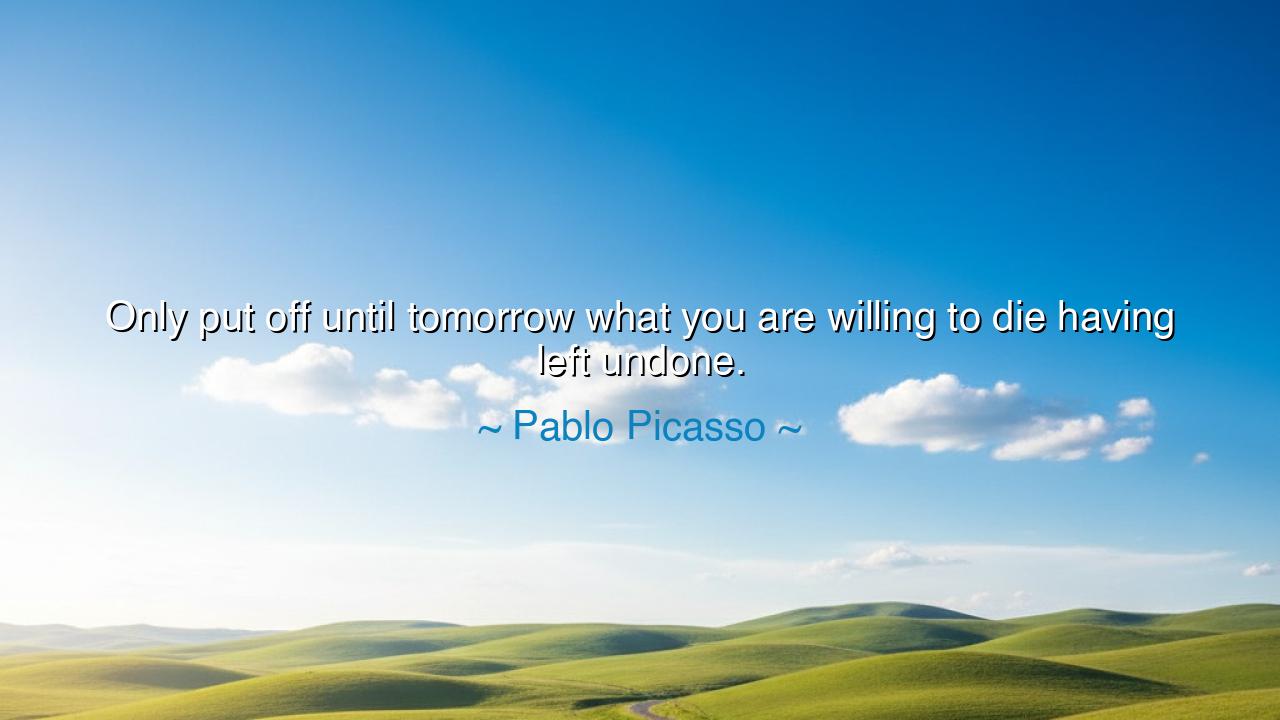
Only put off until tomorrow what you are willing to die having






The words of Pablo Picasso, “Only put off until tomorrow what you are willing to die having left undone,” thunder like a summons against sloth and hesitation. He reminds us that life is brief, its end uncertain, and that to delay what matters is to gamble with eternity. Each day is a gift placed into our hands, and each task deferred is a seed that may never take root. Thus, the wise soul asks: if death should come tonight, what duties, what dreams, what words of love am I content to leave unfinished?
The ancients too declared this truth. The Stoics spoke of memento mori—“remember you must die”—not to darken the spirit, but to sharpen it. They taught that the awareness of mortality should make each moment burn brighter, each action more urgent. Picasso’s words echo this ancient discipline: to live as if every day might be the last, to put off nothing except what the heart would gladly consign to dust.
History bears this out in luminous example. Consider Alexander Hamilton, struck down in his duel with Aaron Burr. His life’s work—The Federalist Papers, the founding of financial institutions, his vision for the American republic—burned with intensity because he knew time was never guaranteed. Though his end came early, he had poured his days into lasting deeds, leaving little of greatness undone. His legacy reminds us that urgency is not haste, but the discipline of refusing to waste the hours we are given.
Picasso himself, though a man of the arts rather than the battlefield, lived in relentless pursuit of creation. He understood that tomorrow is never promised, and that each stroke of the brush, each birth of form and color, must be seized in the present. It was this urgency that allowed him to leave behind thousands of works, a legacy vast enough to echo across centuries. He did not wait for tomorrow to do what the soul demanded of him today.
Let the generations remember this: death waits for no man, and the clock is deaf to excuses. Do not delay the kindness, the word of reconciliation, the act of courage, the creation of beauty. For every tomorrow is a gift, but no tomorrow is promised. Thus, live so that when death arrives, nothing of true worth lies abandoned in your hands. For in this lies freedom: to meet the end unafraid, knowing nothing essential was left undone.






TALe Thu Anh
There’s an equity wrinkle here. Some people can rearrange life to honor their deepest priorities; others are juggling multiple jobs or care duties and can’t treat every day like a manifesto. How do we translate this ethic without shaming those with fewer choices? I’m looking for a two-level approach: personal triage (one meaningful act within realistic bandwidth) and structural asks (predictable schedules, paid leave, safer housing). What guidance would you give someone in a precarious season to apply this compassionately, not punitively?
NTNgoc Trum
As a creative, I hear a demand to ship. Perfectionism tells me to polish; this mindset says release the version that teaches me the most. What cadence keeps output alive without trashing quality—weekly small drops, quarterly larger works, or public drafts with time-limited revision windows? Which metrics matter: audience learning, skill growth, or future optionality created? I’m intrigued by a nightly ‘one paragraph or one page’ rule and a public archive. How would you structure feedback so momentum beats self-editing spirals?
LNTuan Lam nhat
I can’t stop thinking about relationships hidden inside this philosophy. If today were finite, would I prioritize calling my parents, writing a will, repairing a friendship, or reading bedtime stories without my phone nearby? Daily logistics fight those choices. What weekly ritual hardwires what truly matters—Friday family check-ins, scheduled estate planning tasks, or a recurring “one generous act” block? I’m seeking a blueprint that makes relational maintenance non-negotiable, even when inbox fires flare and productivity biases crowd out quieter obligations.
ANAnh Ngoc
Part of me reads this as an indictment of procrastination; another part knows delay can be intelligent—gathering info, letting emotions settle, or waiting for a better window. How do you distinguish protective patience from fear in disguise? Maybe add a 24-hour hold with a written reason, next concrete step, and a trigger that ends the pause. If the reason is vague or the step unclear, you’re stalling. Could you sketch a short experiment to test this in a messy week of real constraints?
LNLuong Nguyen
This hits me like a prioritization siren, but I wonder how to calibrate it so it motivates rather than terrifies. If I let mortality set every agenda, I’ll chase only urgent, emotionally vivid tasks. What decision tools keep focus without creating panic—regret-minimization prompts, a weekly “top one thing,” or time-boxed pre-mortems? How do you identify work that can safely wait: reversible choices, low-compounding tasks, or items with weak stakeholder dependence? I’d love a rubric that balances meaning, risk of delay, and recovery options.